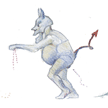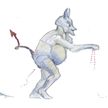 ------------------------------------------------
------------------------------------------------ ___Next Image
___Next ImageDrawing from the Mas: A Trindidad Sketchbook
Previous Image___ ------------------------------------------------
------------------------------------------------ ___Next Image
___Next Image
The Identity Thief is a contemporary interpretation of the Midnight Robber, in which the frontier for banditry has moved into cyberspace. Bedecked by stolen credit cards, ID cards, and other trophies of his exploits, the Identity Thief has traded his customary six-guns for a more pernicious and ubiquitous weapon, a pair of fiber-optic cables – the medium through which he steals away precariously accessible souls along the information superhighway. Here, the coffin has been replaced by a monitor, really a simple mirror to show victims that their souls are already secured, en-crypted so to speak, at the moment of encounter. The traditional wire-mesh mask used in Carnival worldwide, here elongated to create stark, barcode-like eyes, also serves as a visual pun: from screen-mesh, to computer-screen, or even Freud’s “screen memory”, the dimly-recalled revision of experience from which we construct fragile sense of self. Indeed, in an age when we have all become entwined in the web of information, the Midnight Robber – more omnipresent and less visible than ever – is alive and well.
The Moko Jumbie, gazing from his vantage point high atop vertiginous stilts, represents (in some interpretations) a guardian spirit, keeping vigil on the distant horizon, ready to alert us short-sighted ground-dwellers of dangers or wonders to come. This particular figure builds on the Carnival precedent of using themes for Greek mythology. Based on Argus, the thousand-eyed night watchman for Hera, this jumbie is covered from head to toe with telescopic eyes, protruding in all directions. Radio dishes cuff his hands and feet, a reference to the SETI Program, whose skyward antennas continually search for sentient beings that, like the jumbie himself, belong to other worlds.Yet this jumbie is an ambivalent figure. The eyes that gaze outward may also gaze inward. At a time when we are fast becoming an acquiescent culture of surveillance and voyeurism, the Orwellian aspect of the all-seeing watcher can be more a menace than a comfort. Fortunately, the Argus myth points to a remedy. In the original tale Argus is lulled to sleep by the lyre of Hermes. In the overwhelming musical sea of Carnival, individuals can slip the jumbie’s gaze and lose themselves amidst the anonymity of the crowd, unwatched and unhindered for the moment. He can’t watch us all, since an eye in every direction may the same as no eyes at all.
 __ Back to Drawing from the Mas
__ Back to Drawing from the Mas